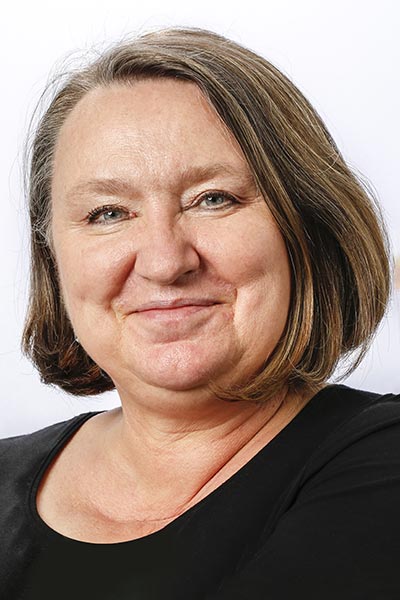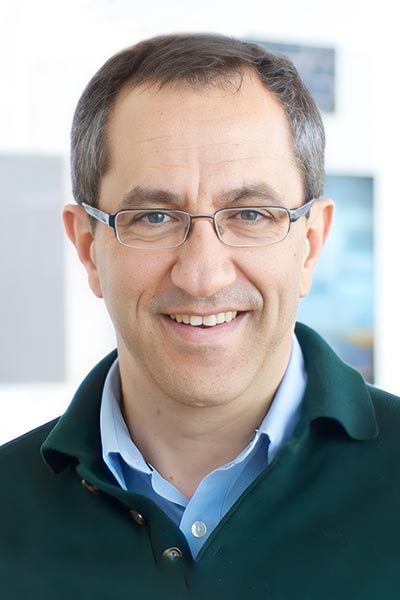Annual Meeting program opens with dozens of comprehensive educational sessions
The AACR Annual Meeting 2023 program opens with a robust schedule of more than 50 educational sessions beginning Friday, April 14, and continuing through Saturday, April 15. Access to these sessions is available to all Annual Meeting registrants who purchased the Educational Program Pass during registration. The Educational Program Pass also includes access to methods workshops on Friday and Saturday.

“From the most innovative basic science research coming out of laboratories around the world to next-generation, practice-changing therapeutics emerging from clinical trials, this year’s educational sessions and methods workshops cover the latest discoveries across the spectrum of cancer research,” said Karolina Palucka, MD, PhD, Professor and Director of the JAX Cancer Center at the Jackson Laboratory for Genomic Medicine and Professor in the Department of Immunology at the University of Connecticut School of Medicine. “In designing the program, we strived for diversity and inclusion in all aspects of cancer research. We also included sessions intended to provoke discussion on some of the most recent topics in the field.”
Palucka serves as co-chair of the AACR Annual Meeting Education Committee alongside Carlos M. Caldas, MD, PhD, Professor of Cancer Medicine and Honorary Consultant in Medical Oncology at the University of Cambridge, UK.
“These sessions open the meeting and really set the stage for the entire Annual Meeting program by offering attendees, no matter what area of science or medicine they work in, the opportunity to get high-level overviews of some of the latest advances in cancer research,” Caldas said.

Following are a few highlights of this year’s educational sessions. Check the Annual Meeting online planner for the complete schedule.
FRIDAY, APRIL 14
ED013: From the Patient Voice to the FDA, Early Phase Clinical Trials
3 – 4:30 p.m. ET | Room W311 E-H, Convention Center
In this session, faculty will discuss new approaches to using patient-reported outcomes (PROs) in early phase clinical trials, including item banks and item libraries for creating patient surveys tailored to the trial treatments, novel designs for integrating PROs in dose-finding trials, and statistical analysis and visualization approaches to support interpretation of data in early phase trials.
ED030: The Bacterial-Cancer Axis: What Does it Mean?
3 – 4:30 p.m. ET | Room W331, Convention Center
This session will provide an overview of current research focused on understanding the role of bacteria in cancer, including some discussions on how to evaluate the impact of microbes on the immune response, cancer risk, and response to treatment. The speakers will discuss approaches, new findings, and challenges in three different fields addressing the bacteria-cancer axis.
ED035: The Dark Side of Our Treatments: Therapy-induced Comorbidities
3 – 4:30 p.m. ET | Tangerine Ballroom 1 (WF1), Convention Center
During this session, speakers will summarize clinical aspects of chemotherapy-induced neuropathy and chemotherapy-related cognitive impairment, including incidence and disease burden, current diagnostics and novel biomarkers; discuss new insights into molecular mechanisms; and elucidate novel therapeutic avenues for these long-term consequences of cancer treatment.
ED038: How Can We Realize the Promise of Novel Technologies for Early Cancer Detection?
3 – 4:30 p.m. ET | Room W312, Convention Center
Session faculty will review products under development for both single and multi-cancer detection and the evidence needed to realize the promise of new cancer screening technologies. Speakers will talk about the use of these tests for population screening and discuss the potential obstacles to ensuring that all persons will benefit from the new tests.
ED001: Chemistry to the Clinic: Part 1 of 3: The Next Generation of Antibody Drug Conjugates
4:45 – 6:15 p.m. ET | Room W224, Convention Center
This session will review recent progress in the development of antibody-drug conjugates (ADCs) for oncology applications, including the use of novel cytotoxics, biologically targeted agents, and immunostimulatory agents as payloads. Challenges associated with these new research directions will be discussed along with potential solutions, such as novel conjugation approaches and/or higher drug-to-antibody loading relative to legacy ADCs.
ED049: T Cell Therapies in Immunologically Cold Malignancies
4:45 – 6:15 p.m. ET | Chapin Theater, Convention Center
The speakers in this session will discuss several tumor-intrinsic and -extrinsic mechanisms involved in keeping T cells away from their tumor targets, including the lack of tumor cell recognition by T cells, as well as the physical/chemical constraints imposed by the surrounding stromal cells. Therapeutic strategies to counteract this exclusion phenomenon will be discussed.
SATURDAY, APRIL 15
ED011: Systemic Multi-Organ Communication During Cancer Progression
8 – 9:30 a.m. ET | Valencia BC, Convention Center
In this session, faculty will provide an overview of how signals from the central nervous system contribute to cancer progression via their effect on cancer cells, stroma, and immune cells. Speakers will also discuss the relationship between tumor cells and local and distal tumor immunity, tumor angiogenesis impacting tumor immunity and immune checkpoint blockade therapy response, and how this knowledge may translate into new cancer therapies.
ED017: Evolution of Drug Resistance
8 – 9:30 a.m. ET | Chapin Theater, Convention Center
This session will cover how factors — such as the type of drug used, the length of treatment, and the presence of genetic mutations — contribute to the evolution of drug resistance. Speakers will also examine the challenges associated with resistance evolution and strategies to overcome drug resistance through combination therapy and personalized medicine.
ED025: Innovations in Methods for Adapting and Personalizing Interventions for Cancer Control
10 – 11:30 a.m. ET | Room W312, Convention Center
This educational session will provide an accessible introduction to recent methodological advances for optimizing adaptive interventions, which explicitly guide how to modify the type/intensity of services based on information about the individual and how to deliver just-in-time adaptive interventions, which leverage information about the person’s state and context to adapt intervention delivery in real-time, real-world settings.
ED040: Chemistry to the Clinic: Part 2 of 3: Leveraging Induced Proximity: Beyond Targeted Protein Degradation
10 – 11:30 a.m. ET | Room W224, Convention Center
This session will cover the promise of targeted protein degradation research for drug discovery and the next phase of induced proximity research, including emerging opportunities for non-degrading molecular superglues, sequence-based design of small-molecule RNA degraders, and the mechanism of action of velcrin small molecules.
ED005: Using Big Data in Population Science
12:30 – 2 p.m. ET | Room W311 A-D, Convention Center
This session’s faculty will discuss the use of “big data” in population science and the potential for data-driven discoveries to improve prevention, early detection, diagnosis, treatment, and survival of cancer. Speakers will describe the appropriate and responsible use of electronic health records to accurately identify treatment plans, improve patient outcomes, and develop predictive models for clinical decision support.
ED007: Waste Not, Want Not: Discovery in Cancer Cachexia
12:30 – 2 p.m. ET | Room W312, Convention Center
This session will serve as a boot camp for attendees, highlighting state-of-the-art experimental methodologies and new discoveries in cancer cachexia, which afflicts most patients with advanced cancer. Speakers will describe how investment, efforts, and experimental treatments for cancer cachexia research are increasing.
ED015: Exploiting the DNA Damage Response in Novel Therapy Approaches
12:30 – 2 p.m. ET | Valencia A, Convention Center
Speakers in this session will describe novel therapeutic approaches designed to exploit the DNA damage response, including overcoming PARP inhibitor resistance by targeting POLQ or USP1, radiation-induced DNA damage response to modulate cancer cell immunogenicity and response to immunotherapy, and exploiting the synthetic lethality interaction.
ED004: Understanding the Disease Biology of ALL: Insights from Genomic and Translational Studies
2:30 – 4 p.m. ET | Room W312, Convention Center
In this session, presenters will discuss new insights into the pathogenesis of both B- and T-lineage acute lymphoblastic leukemia (ALL), recent translational work focusing on novel therapeutics for high-risk subsets, and the need for new approaches to manage relapsed disease and ALL in older adults.
ED048: Chemistry to the Clinic: Part 3 of 3: Covalency and Target Validation
2:30 – 4 p.m. ET | Room W224, Convention Center
This session will focus on covalent drug discovery as a powerful therapeutic strategy for cancer. Speakers will describe cutting-edge efforts in using covalency to drug the undruggable, discover novel therapeutic targets, expand the scope of targeted protein degradation, and uncover new therapeutic modalities beyond degradation.
ED052: Tumor Heterogeneity: Rapid Autopsy to Longitudinal Biopsies: What Can We Learn?
2:30 – 4 p.m. ET | Room W331, Convention Center
Results from three autopsy programs will be presented in this session. The results offer insights into the complexity of genomic instability processes, mutational signatures, and immune-evasive strategies that manifest during the metastatic process throughout tumor evolution. Through such efforts, evolutionary rule books can begin to be deciphered governing tumor progression, immune escape, and drug resistance.
More from the AACR Annual Meeting 2025
View a photo gallery of scenes from Chicago, continue the conversation on social media using the hashtag #AACR25, and read more coverage in AACR Annual Meeting News.

